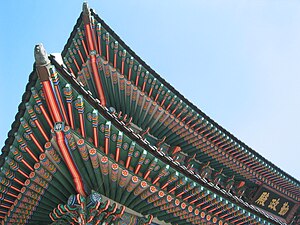The Korea Meteorological Administration (KMA) said 25.8 cm of snow had blanketed the Seoul metropolitan area Monday morning, the most amount of snow South Korea has seen since KMA first kept record in 1937, causing major disruptions in traffic and morning commutes.
Local media reported that a heavy snow warning was issued by the government as the plunging snowfall blocked entry to 13 major highways, and 19 principal roads, as well as 14 of the busiest streets in downtown Seoul.
The city officials also closed all mountain roads leading to the downtown area as Seoul's urban highways and riverside expressways were already gridlocked with commuting vehicles.
The unexpected snowstorm hit the city within a five-hour window in the early hours of Monday and traffic congestion forced morning commuters to abruptly switch to subways, buses, and public transportations that subsequently brought further chaos to the surging crowd.
However, buses were sluggish too, driving at a half-speed on icy roads, and commuters had to deal with a 30 minute to 1 hour delay in most areas.
For example, a bus drive that usually takes 1 hour from Bundang,a southern city of Seoul, to Yeoido, a large island located in Seoul, took about 4 hours Monday.
Subways experienced heavy delays as well, due to electrical malfunctions caused by snow and icy conditions, as services for the One train and Two train both were suspended for nearly 20 minutes.
"It usually takes less than half an hour to get to Gwanghwa Moon from Gangnam by subway but today it took me more than an hour," Oh Ryun-kwon told Xinhua.
A gas station staff clears road in front of the station in Seoul, capital of South Korea, Jan. 4, 2010.(Xinhua/He Lulu)
A gas station staff clears road in front of the station in Seoul, capital of South Korea, Jan. 4, 2010.(Xinhua/He Lulu)
Photo Gallery>>>
Oh, who works in the Gwanghwa Moon business district of Seoul, was particularly disgruntled at the city's response to the snowstorm as he described the morning commute scene as "chaotic."
In fact, the city deployed 3,500 civil service personnel and 2,300 tons of calcium chloride as part of its snow removal work, but the snow was unexpectedly more than forecast and the record-setting snow is still falling unremittingly with heavier falls forecast until Monday night, making it hard to clean up.
The snowstorm was far-exceeding the initial forecast reported by the KMA Sunday night, which said approximately 2 cm to 7 cm of snow was expected on Monday.
"Snowfall began at 5 a.m. in Seoul and as much as 7.5 cm was recorded in just two hours. Snow is expected to stop falling Monday evening," a KMA official was quoted as saying by news agency Yonhap.
In an attempt to prevent further traffic delays, city officials announced on Monday that they will extend the subway operating hours and speed up train intervals during Tuesday's morning rush-hours.
The city of Incheon, on the other hand, has canceled all eleven ships scheduled to depart their port Monday as well, with flights from Gimpo Airport, the country's second largest airport located in the far western end of Seoul, canceling all flights for the first time since 2001.
In the meantime, the temperature in Seoul dropped furthermore Monday morning, causing most roads to freeze and become icy, exacerbating the traffic problem.
"With temperature plunging to minus 6.9 degrees Celsius early Monday morning, most roads in Seoul and neighboring areas are expected to become icy," said the weather official as he asked for special driver's discretion, according to Yonhap.
The country's weather office forecast an additional 2 cm of snow in the Seoul metropolitan area, as one of the officials described it as "the most in the last 100 years."
source-http://news.xinhuanet.com

![Reblog this post [with Zemanta]](http://img.zemanta.com/reblog_e.png?x-id=792eaf2a-ce42-4740-ad2d-474743e3cb25)
0 Responses to Snowstorm blasts South Korea